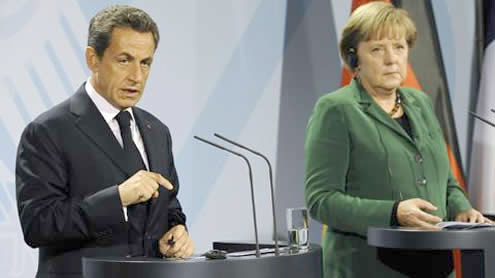 EU leaders are locked in late night talks at a summit called to tackle the eurozone debt crisis.
EU leaders are locked in late night talks at a summit called to tackle the eurozone debt crisis.
The key item on the agenda in Brussels is a Franco-German plan on budgetary discipline, with automatic penalties for eurozone nations that overspend.Reports say Berlin and Paris failed to secure backing from all 27 EU members to change the bloc’s treaties to proceed with reforms.Any deal will now likely involve only the 17 eurozone members.World shares have fallen after the European Central Bank ruled out any substantial aid for indebted nations.
The US Dow Jones index closed down 1.6%. French and Italian shares ended down 2.5% and 4.3% respectively. Shares on Asian markets opened lower on Friday.Just before the summit started on Thursday, UK Prime Minister David Cameron, French President Nicolas Sarkozy and German Chancellor Angela Merkel held 45-minute talks, but sources told the BBC there was “no movement” with each side setting out their respective ground.UK Prime Minister David Cameron has repeatedly warned he will veto anything which harms British interests.In a speech in Marseille earlier on Thursday, President Sarkozy warned that “never has the risk of disintegration been greater” for Europe.
The leaders of the 27 EU nations began the summer with an informal dinner, and later continued their talks behind closed doors. A number of working sessions is also planned on Friday.A set of draft conclusions has been circulating in Brussels and has been seen by the BBC.The draft text proposes a limit on structural deficits of 0.5% of GDP, compared with the present limit of 3% including debt repayments.
It also includes a way of increasing the firepower of the eurozone bailout fund above 500bn euros (£426bn; $670bn) – a measure which Germany has staunchly opposed.However, the draft conclusions are likely to change substantially before a final text is adopted at the end of the summit.Germany and France are pushing for changes to the EU treaty, saying stricter fiscal rules should be made part of basic EU law.
The Franco-German plan is based on the following key provisions:The European Commission to have the power to impose penalties for nations that run excessive budget deficits all 17 eurozone nations should amend their national legislation to require balanced budgets the eurozone countries to have common corporation and financial transaction taxes any future bailouts would not require private investors to absorb part of the costs, as happened in the case of Greece As Mrs Merkel arrived at the summit venue in Brussels, she told journalists: “The euro has lost credibility and that needs to be restored.”
She said the European Commission and the European Court of Justice would have more powers in future to enforce the rules, declaring: “We must make clear that we accept more co-ordination.””Never has Europe been so necessary. Never has it been in so much danger,” said Mr Sarkozy at a meeting of EU centre-right leaders in Marseille.He said the eurozone economies still had a few weeks to decide, but that time was working against them.Earlier on Thursday, the ECB cut interest rates back to their historic low of 1%, as expected by financial markets.
ECB President Mario Draghi called again for governments to cut their borrowing and reform their economies, but did not mention any new financial support from the ECB for struggling governments.”We have a treaty that says no monetary financing to governments,” he told reporters.Drawn-out process?European Council President Herman Van Rompuy has put forward an alternative plan, a fast-track “fiscal compact” that does not need lengthy ratification by parliaments or national referendums.
The EU’s most recent treaty, adopted in Lisbon in 2007, took eight years to negotiate.But Swedish Prime Minister Fredrik Reinfeldt warned that changing the treaty would take time and trigger the need for a referendum.In recent days, smaller EU nations have complained they are being forced to follow the agenda of Germany and France, with very little room for discussion, says the BBC’s Chris Morris in Brussels.An advisory committee to the Finnish parliament has warned that the Franco-German plan may be unconstitutional because it replaces the majority veto on the fund for future bailouts with majority voting. – BBC












